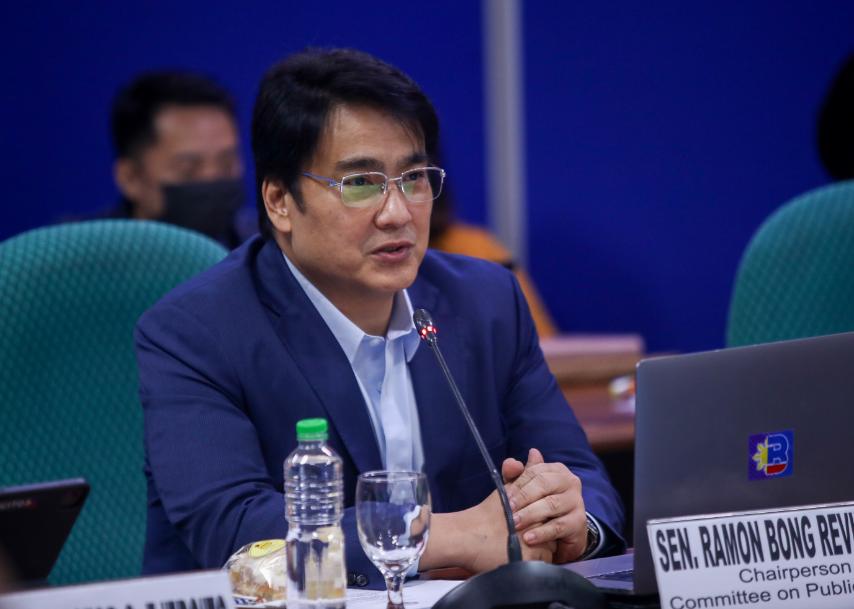DENR chief bares multiple behavioral changes in Manila Bay amid reclamation
By Dhel Nazario
Department of Environment and Natural Resources (DENR) Secretary Maria Antonia Yulo Loyzaga bared changes that they have since observed in Manila Bay following reclamation projects that have so far been conducted there prior to its suspension last year.

She disclosed their findings during the Senate Committee on Public Works chaired by Senator Ramon "Bong" Revilla Jr. which sought to discuss the flood control master plan and pending flood control projects of the Department of Public Works and Highways (DPWH).
"Just to summarize, the findings are that any physical change in the configuration of the embayment that is included in this area will change also the way the water and the pollutants as well as the other elements that are chemically-present and biologically present in the bay; it will change the way these behave," Loyzaga said.
"In general po, reclamation projects will slow down the flow of water and will change the circulation and retention of pollutants and organic materials that are already in the bay. This doesn't include yet what will be coming from the inland. So what we're doing now is combining what is coming from the inland, under different bodies of water, and what is coming from the ocean itself, from the bay itself," she added.
This was Loyzaga's response to Senator Joel Villanueva, who asked if the reclamation projects in Manila Bay have any direct effects to nearby areas in the National Capital Region (NCR).
Yet, she did not categorically confirm if the reclamation projects contributed to the massive flooding experienced due to the rains dumped by typhoon Carina that was enhanched by the southwest monsoon or "Habagat".
On the other hand, she also disclosed that the reclamation projects will also begin to change the water quality.
She then brought up Mandamus ruling issued by the Supreme Court in 2008. Under it, 13 government agencies are directed to clean up, rehabilitate, and preserve Manila Bay, and restore and maintain its waters to make it fit for swimming, skin-diving, and other forms of contact recreation.
"So the idea of the cumulative impact assessment was undertaken by the DENR because in fact, we're the lead implementing agency of the Mandamus and if we are to fulfill that mandate under the decision of the Supreme Court, we will need to substantiate scientifically what would allow us to achieve what is the purpose of that ruling," Loyzaga said.
"With the model run that we are actually undertaking, there will be an ecological cost and economic cost to introducing anything into Manila Bay in relation to the implementation of Mandamus ruling," she added.
According to Loyzaga's data, she said that out of 199,400 hectares that make up Manila Bay there have been 2,576 hectares that have been awarded in the NCR area alone.
5,500 flood control projects
DPWH Secretary Manuel Bonoan stated that the 5,500 completed flood control projects during the third State of the Nation Address of President Marcos were only for immediate relief or stand-alone projects to provide immediate relief to low lying areas.
"Ito naman po yung mga have given immediate relief and protection to low lying areas all over the country. Ito yung sinasabi naming 5,000 na natapos na (These are the projects who have given immediate relief and protection to low-lying areas all over the country. This is the 5,000 projects that we are referring to)," he said.
In order to operationalize the projects that are identified with the flood control master plan, there has to be feasibility study, detailed engineering design, and a discussion with the financing program from the lending institution, before it can be implemented.
"I have taken a look already and most of them, the master plans are still currently being updated at this point in time taking to account the climate change phenomenon and other factors that have to be incorporated into the master plan," he said.
Senator Imee Marcos asked and Bonoan confirmed that there's zero budget for big foreign-assisted flood control projects and was put in the unprogrammed funds of the 2024 General Appropriations Act (GAA).
"In 2023 ganon din, na-zero lahat ng malakihang projects. So ang sinasabi ninyo ang maaasahan lang ng Pilipino itong tagpi-tagpi, patsi-patsi tingi tingi na magbibigay ng immediate relief sana, ngunit ung malawakang flood control wala na? Nakakalugmok po e (It's the same in 2023, big projects got zero budget. So you're saying that Filipinos can only expect immediate relief from this different minor projects, but there's nothing for bigger flood control projects? It's disappointing)," she said.
Revilla called for the hearing to exact answers from relevant agencies on the status of government flood management projects.
"Totoo man na mas mabilis ang paghupa ng baha ngayon, hindi pa rin tama na dito mapunta ang usapan. Kasi hindi na dapat pinag-uusapan yung paghupa, ang pinag-uusapan dapat ay yung hindi na magbabaha. Hindi sapat na mabilis humupa ang baha dahil hindi naman talaga dapat bumabaha (While it's true that flood waters dissipate faster now, this should not be the topic. What should be talked about is having no more floods. It's no longer acceptable that floods subside quicker when it shouldn't be flooding in the first place)," he added.